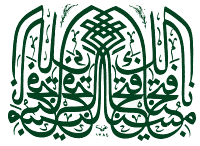
‘And as for that wall, it belonged to two orphan boys living in the town, and beneath it was buried a treasure belonging to them by right. Their father had been a righteous man, and so the Sustainer willed that when they come of age, by the grace of the Sustainer, they should bring forth their treasure from beneath that wall.’
Khidr sought to tend to the affairs of the physical world, and to protect the rights of the most vulnerable members of the community, regardless of his own self-interest. He rebuilt a wall beneath which a treasure was hidden – a treasure of understanding that could only be obtained by its rightful owners after the passing of time and acquisition of personal experience. This treasure is the rightful inheritance of our children – the gifts we offer to the world, and to the future.
The wall reintroduces the subject of the symbol of the servant of Moses (waiting to reappear since Moses and Khidr ventured off together alone). That subject is the material world and the physical body, and the things that serve to protect our inner treasures. Walls are boundaries, the body is one boundary, the limits of our understanding another, our conscience another, and the sharia yet another. Treasures are protected and their integrity maintained beneath a healthy boundary. If we let those boundaries weaken, our treasures can be stolen from us.
In the same way, biblical and esoteric traditions refer to the metaphor of salt, a symbol of physical reality, the sharing of which is a symbol of shared humanity.
"Thou shalt not suffer the salt of the covenant of thy God to be lacking from thy meat offering: with all thine offerings thou shalt offer salt."
Leviticus 2:13
"In gratitude for your bread and salt, I must preserve you from all danger."
Mevlana Jelaluddin Rumi
Without salt, our offerings are nothing more than lifeless flesh. Our conversations with Allah must always be accompanied by an honest acknowledgement of the reality of how our philosophies and actions – our "offerings" – manifest on the physical plane. If we act as if this doesn’t matter, destroying our protective boundaries or those of others, we cannot serve our purpose in this world – to bring forth our treasures as we come of age. We may find ourselves like the righteous father in an inhospitable community – dead, our walls crumbling, unable to guide our children into their own maturity, or deliver our legacy to them.
Without the salt that regulates the passage of fluid through the cell membrane, helping to maintain the structural integrity of the cell, the cell cannot serve its purpose. Without a wall to protect the treasure, the treasure will be looted and taken from its rightful owners. In the same way, human beings cannot be whole in the physical world or in our human interactions, or serve our earthly purpose effectively, without strong boundaries and integrity. Those boundaries are established and integrity preserved by way of the faculties exemplified by Moses – rational acumen, compassion, understanding of moral law, and the capacity to speak out on behalf of the welfare of others, regardless of self-interest.